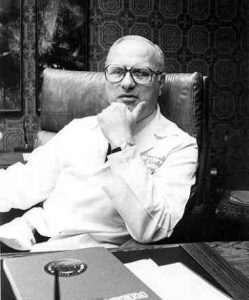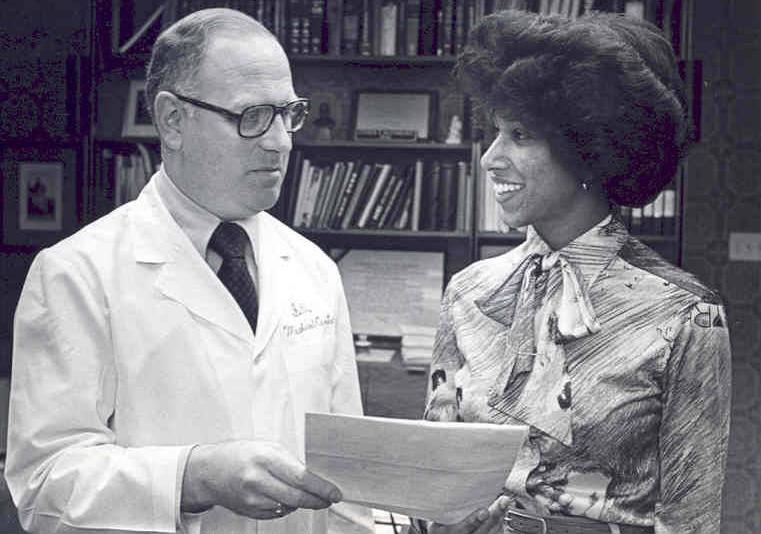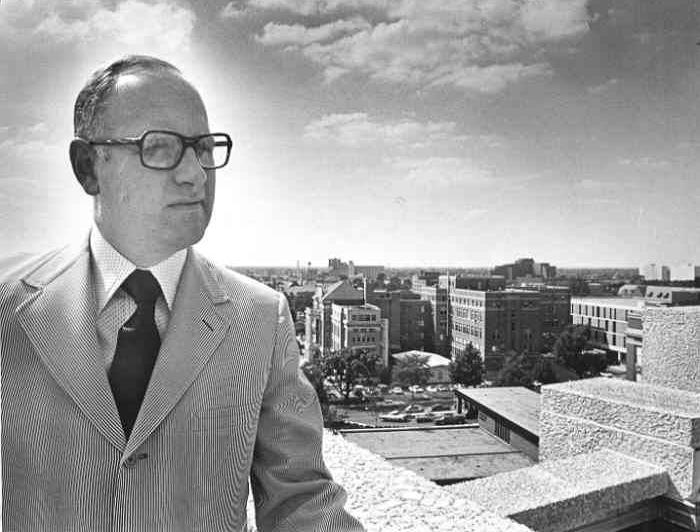
Photo info …
Credit: Indiana University IndianapolisView Source
(Aug. 20, 1932-Apr. 3, 2020). Steven Beering was born in Berlin, Germany, a German of Jewish descent. He spent his early years before World War II in Hamburg. When the Allies bombed Hamburg in a four-day raid in July 1943, Beering, his mother, and younger brother hid with neighbors in their basement. The raid left one million residents homeless, including the Beerings.

Beering was 11 years old when he, his brother, and his mother were sent to work on a farm labor camp. With years of schooling interrupted by the war and work at the labor camp, Beering’s mother homeschooled him and his younger brother as much as possible.
In Berlin, Beering’s father feared his family dead, but the American Red Cross helped him locate them. After the war, the reunited family returned to Hamburg, before moving to London, and then to New York City in 1948 when Beering was 15.

The family eventually settled in Squirrel Hill, a northern suburb of Pittsburgh where they lived with Beering’s grandparents. Beering’s mother’s homeschooling had left him behind his American classmates. He worked hard to catch up and earned straight A’s at Taylor Allderdice High School.
In Pittsburgh, Beering devoted his time to pursuing a career in medicine. He tutored German and French to pay for tuition at the University of Pittsburgh, where he graduated summa cum laude in 1954. He remained in the city for medical school, earning his M.D. financed through a Mellon (full) scholarship in 1958.
After medical school, Beering spent 12 years in the Air Force Medical Corps. He earned the rank of lieutenant and became chief of internal medicine at Lackland Air Force Base in San Antonio, Texas. He served as the doctor for NASA’s astronauts on three early space programs, contributing critical research into the role environmental stress plays in hormonal changes of astronauts.
Former IU Department of Medicine chair encouraged Beering to come to Indiana to continue a professional relationship the two men had started in the Air Force. Joining the faculty at the (IUSM) in 1969, Beering would become the youngest dean of the school in 1974. Under his aegis, the school expanded its footprint by creating community-based regional centers for medical education in Evansville, Fort Wayne, Gary, Lafayette, Muncie, South Bend, and Terre Haute. The number of endowed chairs soared from three to 34 under his stewardship.
Simultaneously, Beering also served as director of the IU Medical Center. He remained in these roles until 1983 when he became the ninth president of Purdue University. During his 17 years as president Purdue took fundraising to new levels which allowed the university to engage in 20 major construction projects, grow its liberal arts programs, promote diversity, and add aesthetic improvements to the concrete-heavy campus. Beering developed a master plan to transform the university into a pedestrian-friendly environment and expanded the university’s international effort by increasing enrollment of international students threefold. Purdue became a home-away-from-home for more international students than any other public university in the country.
In 1983, IUSM established the Steven C. Beering Award. Given annually, the award recognizes internationally recognized individuals for their contributions to the advancement of biomedical or clinical science.
Beering would establish the Beering Scholarships at Purdue University. These scholarships cover all educational expenses for a bachelor’s degree and the opportunity to pursue two additional graduate degrees at Purdue University and a medical degree at IU School of Medicine. Beering established a similar scholarship at Pittsburgh.
Beering was a four-time recipient of the Sagamore of the Wabash. He also received numerous honorary doctorates. In 1999 he received the President’s Medal of Excellence from IU, the highest honor an IU president can bestow. His commitment to medical and higher education was recognized in 2016 when IU School of Medicine-West Lafayette named a wing in his honor, the Steven C. Beering Medical Education Wing.
Beering’s contributions to the space program and Indiana higher education leave a legacy that will inspire those who follow in his footsteps.

Help improve this entry
Contribute information, offer corrections, suggest images.
You can also recommend new entries related to this topic.

